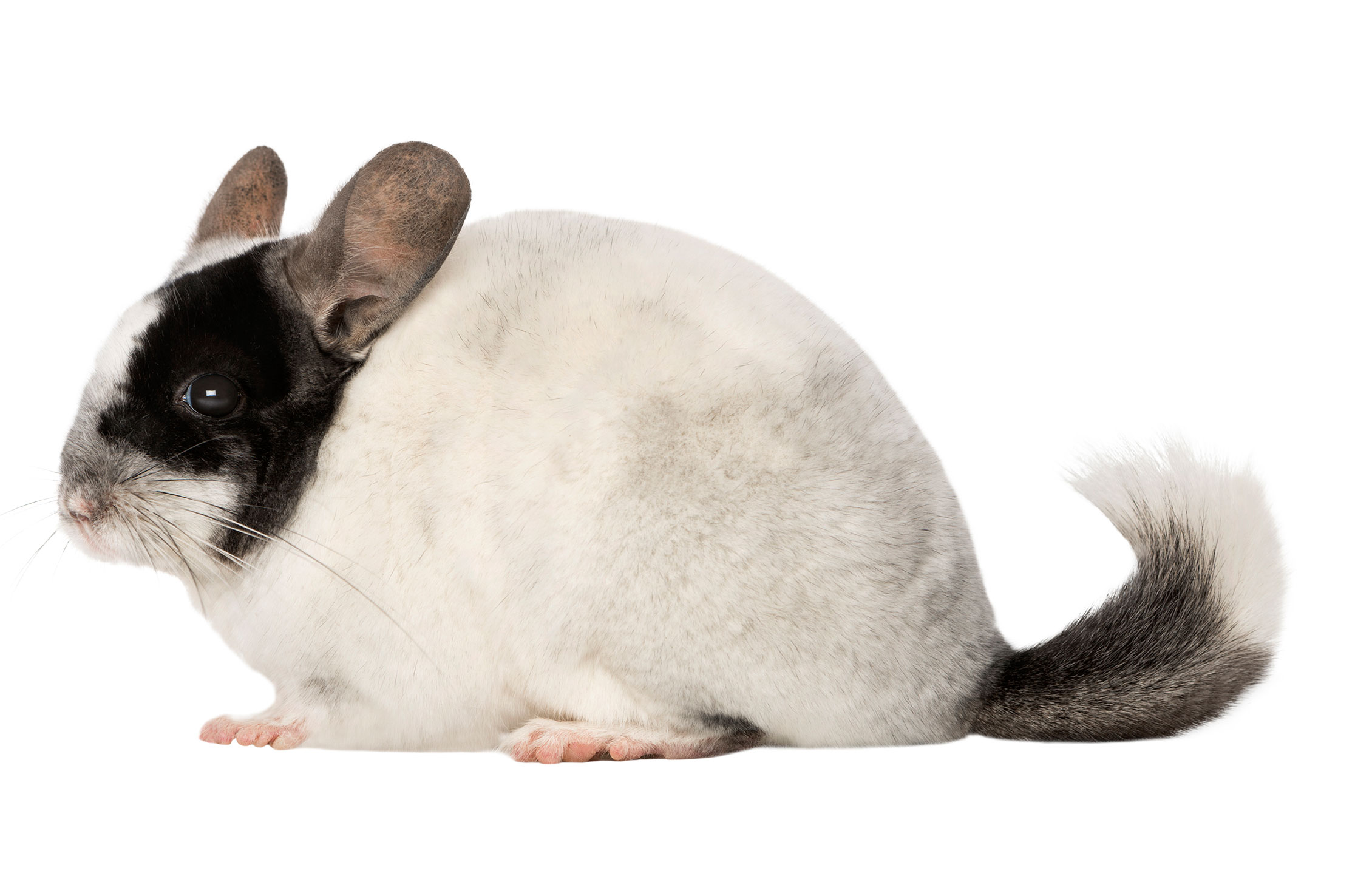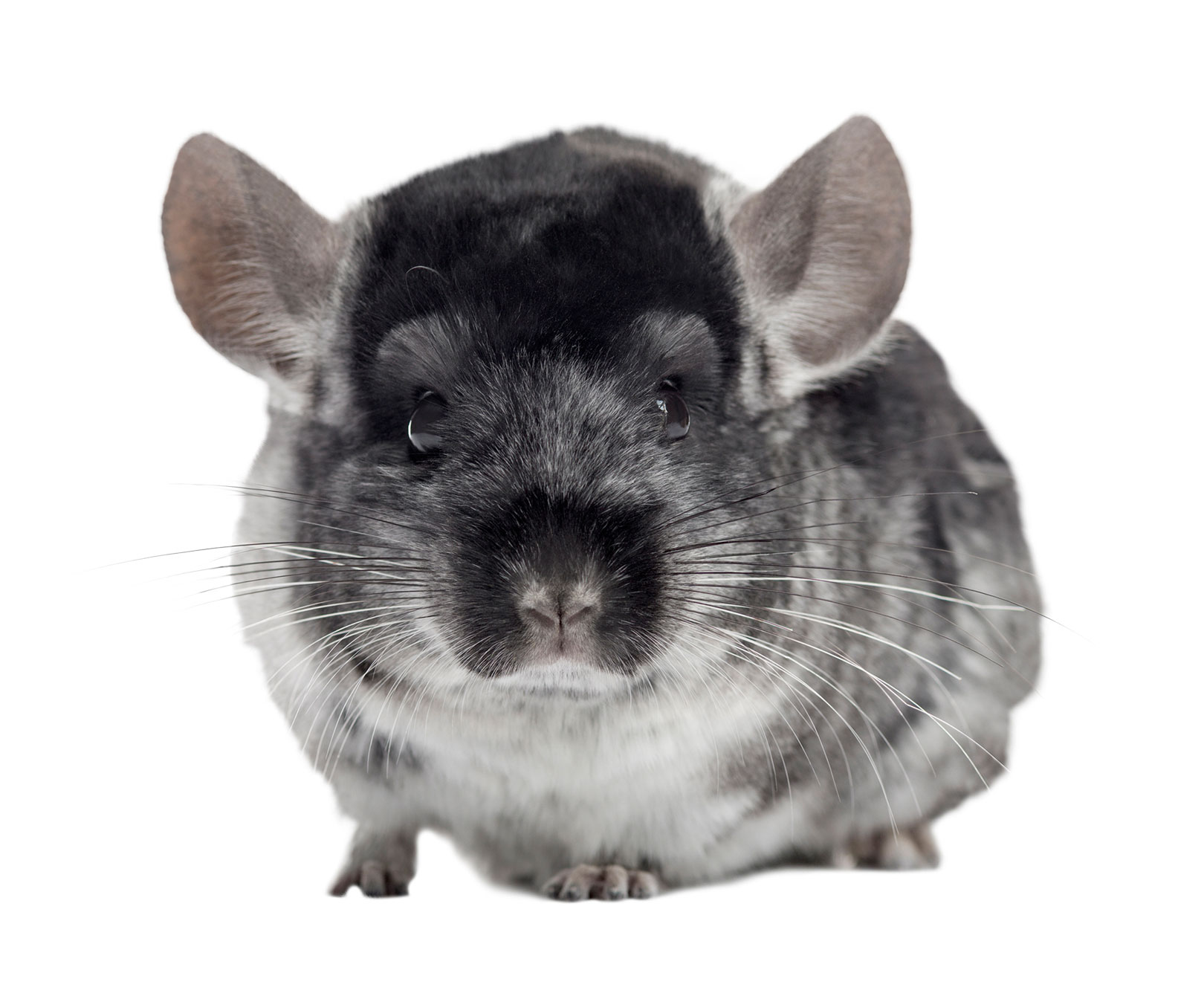|
Chinchillas are cute little creatures that can make a great pet if you’re considering an exotic pet. They tend to be gentle and become tame with enough handling and socialization. Chinchillas live 10-15 years on average, but can live up to 20!
These fluffy animals are from South America, and are nocturnal. They have a soft puffy coat that will require dust baths regularly to ensure good hygiene.
Did you know? Chinchillas cannot sweat or vomit, and their teeth are hypsodont, meaning they continuously grow.

BEHAVIOR
Chinchillas can be energetic little fellas and may run around like crazy, so don’t be alarmed!
They are fast, agile and active, and are very good climbers and jumpers. During play time, they should be supervised in a chinchilla-proofed room. They are chewers and like to bite on exposed items such as extension cords, outlets and baseboards, so ensure they are covered or hidden. Your Nashville chinchilla veterinarian recommends linoleum, tile or wood floors as a play surface for these critters, as it is easier to clean up.
- As mentioned earlier, chinchillas are nocturnal and thus most active at night, dawn, and early morning.
- Female chinchillas tend to be more aggressive and dominant than males.
- Unfortunately, they are difficult to litter-train, but are virtually odorless otherwise.
- They tend to be social creatures, and enjoy pets but may not tolerate cuddling.
- Since they are social creatures, they do well with a partner. At least one of them should be fixed to prevent unwanted pregnancy.
HOUSING
Your local Nashville Chinchilla veterinarian recommends a flat bottom cage for your pet as toe and feet injuries are very common with wired bottoms. The cage should be large enough for your chinchilla to climb, jump and run. Ideally, the cage will be 2 stories to provide extra room. Wood shavings are not recommended, but hay and recycled newspaper pellets are okay.
- A wheel should be available in the cage, but make sure it is made specifically for chinchillas. Ideally the wheel would be 15-18 inches in diameter and have a solid floor.
- Because chinchillas are used to dark places and caves, it is recommended to make a little hut or hiding place in the cage for your critter to hide in.
- Nest boxes can also be added, one for each chinchilla you have. This is where they can sleep and provides shelter from potentially aggressive cage mates.
- Wooden cage furniture, chew sticks and pumice stones can be offered for chewing to help keep the teeth healthy.
- Your chinchilla’s cage should be placed somewhere quiet, with temperatures ranging from 50 to 75 degrees F. Too high temperatures can be fatal due to their heavy coat.
- A typical rabbit water bottle and shallow food dish should be provided.
DIET
- Chinchillas have very sensitive gastrointestinal systems, and need a lot of fiber in their diet.
- Low carbohydrates and low sugar intake are highly recommended as well.
- Slight variations in their diet can cause stomach upset, and may require a trip to your Nashville chinchilla veterinarian.
- Their diet should consist of pellets (daily), good quality timothy hay (daily), and fresh vegetables (3 to 5 times per week).
- Oxbow pellets are our favorite brand.
Good choices for green veggies: arugula, bok choy, cilantro, dandelion greens, kale, mustard greens, parsley, romaine, turnip greens and wheatgrass. Veggies that can be given very sporadically as treats include carrots, bell peppers, brussels sprouts, celery, and summer squash. Fruit can also be given as treats in small amounts, but remember sugar intake is to be watched. Your Nashville chinchilla veterinarian suggests offering at most ¼ teaspoon of fruit per day. Here are some safe options: apple, banana, blackberries, kiwi, mango, peach, pear, plums, strawberries and watermelon.
AVOID: Avocado, beans, bread, broccoli, cabbage, cereals, chocolate, corn, nuts, oats, onion, peas, refined sugar, rice, and seeds. These can cause major stomach upset.
Like rabbits and guinea pigs, chinchillas perform a digestive process called coprophagy to extract as many nutrients as they can! Simply put- they eat their droppings, allowing the food to be ingested.
DUST BATHS
All chinchillas require dust baths at least 2-3 times a week, sometimes more. Their fur is VERY thick, as each follicle contains 80-100 hairs each! Their coats do not dry quickly when wet, so dusting is their way of having a waterless bath. Dusting removes oil and debris from their coats and also is a source of enjoyment!
Dust can be purchased at most pet stores. Make sure the dust is fine and not granular. Put the dust in a dust house (available at most pet stores) and place it in the chinchilla’s cage for 15-20 minutes each time. Alternatively, you can use a litter box for the dust. They will roll around and bath themselves. Make sure to dump the dust and replace it with fresh dust for the next bath because chinchillas will defecate in their dust baths.
MEDICAL CARE
When you first adopt or purchase your new chinchilla, your Nashville chinchilla veterinarian highly suggests an initial wellness exam to ensure health of the pet and to answer any questions about husbandry or care. Annual exams may include fecal checks and bloodwork to ensure your furry friend is healthy.
Chinchillas are very prone to developing dental disease which is often difficult to diagnose at home until it has become severe. Therefore, preventative medicine (yearly health checks) will increase the chance of diagnosing it early when it can be treated and/or managed.

Most common medical problems include:
- Dental disease
- Like guinea pigs, chinchillas can suffer from many dental problems such as overgrown molars and abscessed teeth. Common signs of dental disease are wet chin fur, weight loss, dropping food and avoiding hard foods. Part of a chinchilla’s annual veterinary exam is a through dental exam.
- GI issues (bloat, stasis, diarrhea)- most times considered an emergency
- Eye irritation/conjunctivitis
- They can suffer from eye infections and irritations from dust and debris. Any chinchilla with tearing, redness, or squinting should be examined by a veterinarian.
- Respiratory infections
- Chinchillas can develop pneumonia from a variety of bacterial pathogens and any chinchilla showing increased respiratory effort, nasal discharge and/or weight loss should be examined.
- Fur/skin disorders: ringworm (fungus), fur chewing, loss of fur
- If grabbed suddenly or inappropriately the fur will literally come off in clumps leaving patches of alopecia (hair loss). Always handle a chinchilla gently and never grab the fur directly. Ringworm and mites can also result in hair loss and itchy skin. During the annual examination your Nashville chinchilla veterinarian will ensure that your pet has a healthy coat and skin.
Chinchillas are prey animals, and tend to hide signs of illness very well. This is a behavioral defense to avoid being eaten in the wild.
The following is a list of signs or symptoms which might indicate that your chinchilla is sick. If you observe these in your chinchilla, we recommend scheduling an appointment with your Nashville chinchilla veterinarian.
- Loose, soft or lack of stool
- Small, dry or infrequent stools
- Blood in the urine
- Overgrown front teeth
- Wetness, particularly around the mouth
- Hunching in a corner or lack of activity (lethargy)
- Sneezing or trouble breathing
- Observed difficulty chewing
- Bald patches in the fur
- Sores on the feet
- Abnormal eating or drinking
Emergencies
The following is a list of chinchilla emergencies. If you witness these, seek medical care right away.
- Lack of an appetite: Keep an eye on your chinchilla’s eating habits. If you notice that he or she hasn’t eaten within a 12 hour period, get her to your Nashville chinchilla veterinarian immediately. They may be suffering from gastrointestinal stasis (GI stasis) or bloat, both of which can be fatal if not treated quickly.
- Less poops and urine production than normal. Both can be a sign of stasis or bloat or something entirely different. Fewer poops and urine production than normal, as well as diarrhea, warrant a trip to the vet.
- Suffering from an injury. If your chin has a wound, what appears to be a broken bone, or any kind of injury, consult with the vet as soon as possible.
- Bleeding
- Open mouth breathing/struggling to breathe
- Seizures
- Hunched over
- Lethargic
- Suffering from an intestinal prolapse
- Unresponsive
- Wheezing
|
|
.webp)







